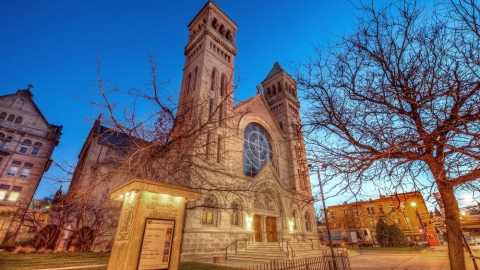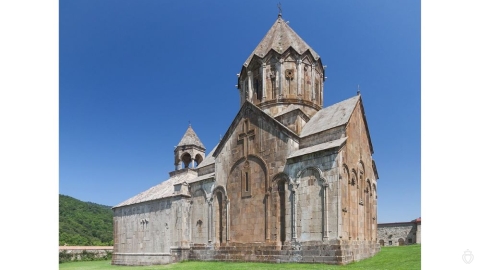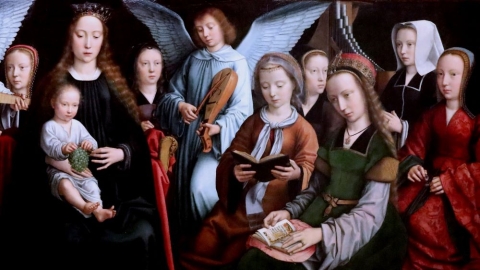The Holiness of the Church (8): The Virtue of Prudence

St. Pius V receiving the vision of the victory of Lepanto
After the theological virtues, holiness in the Catholic Church is manifested by the exercise of the moral virtues exercised to a heroic degree, above human strength, often accompanied by the corresponding gifts of the Holy Ghost. Among these virtues, the first to consider is prudence, which makes it possible to determine the right action to take in a situation, in relation to the ultimate goal, and which commands the execution of this action.
If prudence makes it possible to order the means to the end, the truly prudent will always and only be the saint, the one who has reached the only ultimate end of man, eternal life. In this sense, the Gospel commands us to be “wise as serpents” (Mt. 10:16) and teaches us to reject carnal prudence, which pursues illusory ends: “He that loveth his life shall lose it; and he that hateth his life in this world, keepeth it unto life eternal” (Jn. 12:25).
Personal Prudence
We must first consider personal prudence, that is, that which has as its object the personal justice of the subject, and consequently as its end his eternal beatitude. Evangelical prudence corresponds in this to the folly of the cross. It is the exact opposite of worldly prudence, precisely because it pursues an opposite end.
Some saints pushed the logic of the Gospel to the extreme, until they experienced what the world considered to be real madness. In the 5th century, St. Alexis, from a noble and very wealthy Roman family, secretly abandoned his house and his newly married wife to become a beggar, before returning unrecognized and living as a guest and servant with his family.
St. Nicholas of Trani (11th century) or St. Benedict Joseph Labre (18th century) lived such “crazy” lives: for these saints, contempt for goods and life in this world was dictated by the absolute primacy of eternal goal. Among the martyrs themselves, prudence shines in the extreme, putting bodily life after bliss: they are the true sages quos fatue mundus abhorruit – “whom the world has madly abhorred,” as says the hymn of their office.
The prudence of the saints in their search for the absolute Good of man led them to prefer poverty, even absolute poverty, to isolate themselves from the world, to shun honors and even to abandon high positions: the prudence of St. Peter Celestine burst when, seeing himself incapable of administering the papacy, he renounced it.
But the prudence of St. Pius X was also great when, considering the burden of the papacy imposed on him by Providence, he accepted it as a cross and as a means that God indicated to him for his own salvation, without having chosen it.
Governmental Prudence
The other part of the virtue of prudence is called the virtue “of government” and enables one to bring multitudes of men to their proper end. The most obvious example is that of the saints who founded religious orders: the rules they established are the fruit of this virtue, capable of governing communities of men who help each other to achieve holiness.
But beyond that, there is the political prudence of those who govern the Church or kingdoms. The Holy Pontiffs were so precisely because of their ability to understand the situations that the Church was going through and to propose appropriate choices for the good of their flock.
A shining example is that of St. Pius V: in the face of the Turkish danger which threatened Christianity, and while the Catholic princes of Europe seemed indifferent, he succeeded in organizing the Holy League which defeated the Muslim fleet at Lepanto. It took near-miraculous political prudence to bring together the Spaniards and the Venetians, who had divergent interests and stormy relations.
True Prudence and the Need for Humility
St. Thomas Aquinas enumerates eight parts of prudence, necessary for the perfect accomplishment of one's acts: memory, intelligence, docility, wisdom, reasoning, foresight, circumspection, prudence. We will content ourselves here with noting that they cannot function properly without humility, which remains the foundation of the virtues of the saints.
Remembering past events and estimating them at their fair value is only possible for those who think they can learn from those who preceded them (and in this, memory is linked to docility): love of Tradition, respect for the decision the elders had made is common to the saints.
The great legislators of the Church, whether they were pontiffs like St. Gregory I or St. Gregory VII, canonists like St. Raymond of Peñafort, or founders of religious orders, had the Rule of the Fathers as their reference. Each reform has been an attempt to bring back what was practiced and believed from the beginning. On the other hand, pride – at the origin of modernism according to St. Pius X – broke the bridges with the past, demonstrating by its failures the imprudence in matters of government.
Likewise, reasoning or wisdom requires a humble consideration of reality, examining circumstances (circumspection) and accepting its limitations (prudence). Although inspired by God Himself to make bold choices, the saints were not victims of their own over-the-top imaginations.
In this sense, the choices of the saints were truly prudent (and effective) because they were humble: indeed, they took into account the reality of divine omnipotence, and not their own real or presumed abilities.
The refusal of divine power, a decisive element in the evaluation of reality, can paradoxically lead the proud to excessiveness or pusillanimity. Thus the Blessed Virgin, in the Magnificat, says precisely that God “hath scattered the proud in the conceit of their heart.”
The Potential Parts of Prudence
The secondary acts of prudence are related to eubulia, synesis, and gnome.
Eubulia is the habit of seeking right counsel. Many saints were sought after for their ability to give counsel, to understand what was the best way to achieve one's ends. St. Antoninus, O.P., Archbishop of Florence in the 15th century, was nicknamed “Antoninus of counsel.”
Many kings or princes have followed the advice of the saints, considering them infallible: this was the case of Roger of Sicily with St. Bruno, of Louis XI who took St. Francis of Paula as an adviser, of Ercole Duke of Ferrara who wanted at all cost to have with him blessed Lucia da Narni, or of Charles V with St. Peter of Alcantara.
If synesis is the virtue of judging aright according to ordinary rules – natural and positive – in ordinary circumstances, which makes it difficult to put into evidence in its heroic exercise, gnome is the virtue of judging aright from the higher principles, when, in exceptional cases, it would be impossible to apply ordinary laws to the letter.
This virtue is often difficult to distinguish from the action of the gift of counsel, except by the necessity of a reflection that makes its act, called epikeia, less immediate.
One example of this is Archbishop Marcel Lefebvre: he understood that the situation was such that it was necessary to resort to the highest principles of law, because he could not maintain the profession of the true faith by the literal application of ordinary laws. It is thanks to his virtue of prudence that it is possible today to serve the Church in a priestly life free from modern errors.
Considering that it is very difficult to acquire through repetition of acts a virtue which can only be exercised in exceptional circumstances, and therefore rare, the supernatural character of such a high exercise of gnome appears clearly in Archbishop Lefebvre .
Related links
- The Holiness of the Church (7): The Virtue of Charity-2
- The Holiness of the Church (6): The Virtue of Charity-1
- The Holiness of the Church (5): The Virtue of Hope
- The Holiness of the Church (4): The Virtue of Faith-2
- The Holiness of the Church (3): The Virtue of Faith-1
- The Holiness of the Church (2): The Apologetic Mark
- The Holiness of the Church (1): Dogma
(Sources : Prümmer/DTC – FSSPX.Actualités)
Illustration : Flickr / Fr Lawrence Lew, O. P. (CC BY-NC-ND 2.0)





